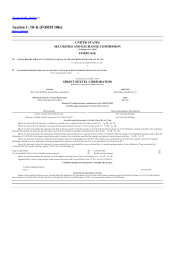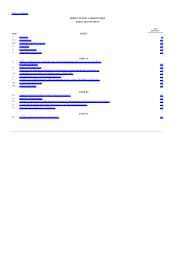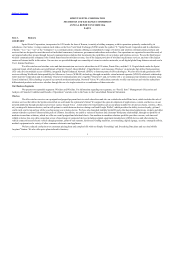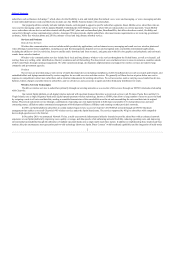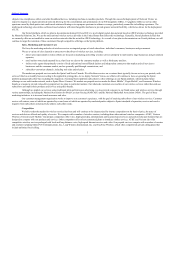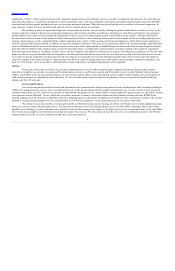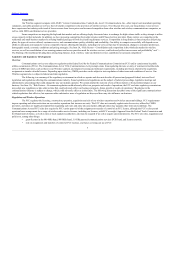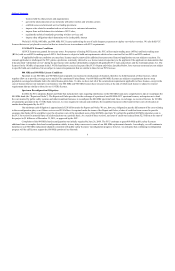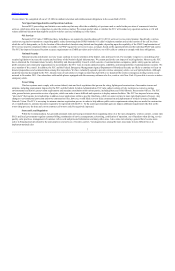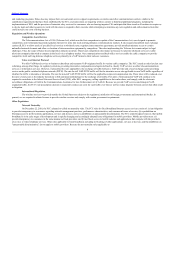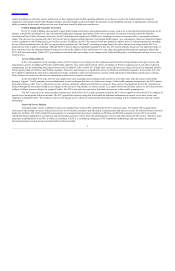Sprint - Nextel 2011 Annual Report Download - page 11
Download and view the complete annual report
Please find page 11 of the 2011 Sprint - Nextel annual report below. You can navigate through the pages in the report by either clicking on the pages listed below, or by using the keyword search tool below to find specific information within the annual report.
Table of Contents
mobile broadband are relatively narrow and because we have deployed open mobile operating platforms on our devices, such as the Android platform created in
conjunction with Google and the Open Handset Alliance, the rules should not adversely affect the operation of our broadband networks or significantly constrain our
ability to manage the networks and protect our users from harm caused by other users and devices.
Truth in Billing and Consumer Protection
The FCC's Truth in Billing rules generally require both wireline and wireless telecommunications carriers, such as us, to provide full and fair disclosure of all
charges on their bills, including brief, clear, and non-misleading plain language descriptions of the services provided. In response to a petition from the National
Association of State Utility Consumer Advocates, the FCC found that state regulation of CMRS rates, including line items on consumer bills, is preempted by federal
statute. This decision was overturned by the 11th Circuit Court of Appeals and the Supreme Court denied further appeal. As a consequence, states may attempt to impose
various regulations on the billing practices of wireless carriers. In addition, the FCC has opened several proceedings to address issues of consumer protection, including
the use of early termination fees, the FCC has opened an investigation into “bill shock” concerning overage charges for voice, data and text usage, and the FCC has
proposed new rules to address cramming. Although the FCC has not imposed significant regulation in this area, the wireless industry has proactively addressed many of
these consumer issues by adopting industry best practices such as the addition of free notifications for voice, data, messaging and international roaming to address the
FCC's bill shock proceeding. If these FCC proceedings or individual state proceedings create changes in the Truth in Billing rules, our billing and customer service costs
could increase.
Access Charge Reform
ILECs and competitive local exchange carriers (CLECs) impose access charges for the origination and termination of long distance calls upon wireless and
long distance carriers, including our Wireless and Wireline segments. Also, interconnected local carriers, including our Wireless segment, pay to each other reciprocal
compensation fees for terminating interconnected local calls. In addition, ILECs and CLECs charge other carriers special access charges for access to dedicated facilities
that are paid by both our Wireless and Wireline segments. These fees and charges are a significant cost for our Wireless and Wireline segments. In November 2011, the
FCC adopted comprehensive intercarrier compensation reforms, including a multi-year transition to a system of bill-and-keep for terminating switched access charges.
These reforms are expected to decrease our terminating switched access expense over time.
In the November 2011 order, the FCC also adopted new rules requiring local exchange carriers (LECs) to lower their rates when they meet certain traffic
pumping “triggers.” Traffic pumping occurs predominantly in rural exchanges that have very high access charges. Under traffic pumping arrangements, the LECs partner
with other entities to offer “free” or almost free services (such as conference calling and chat lines) to end users; these services (and payments to the LECs' partners) are
financed through the assessment of high access charges on the end user's long distance or wireless carrier. As a major wireless and wireline carrier, we have been assessed
millions of dollars in access charges for “pumped” traffic. The FCC's new rules are expected to help limit our exposure to these traffic pumping costs.
The FCC's special access rate proceeding remains open. In the fall of 2011, a trade association asked the DC Court of Appeals to direct the FCC to complete its
special access investigation within six months. The FCC opposed this request, noting that it had asked for additional information on special access rates, terms, and
conditions in September 2011. We continue to advocate for special access reform but cannot predict when these proceedings will be completed or the outcome of these
proceedings.
Universal Service Reform
Communications carriers contribute to and receive support from various USFs established by the FCC and many states. The federal USF program funds
services provided in high-cost areas, reduced-rate services to low-income consumers, and discounted communications and Internet services for schools, libraries and rural
health care facilities. The USF is funded from assessments on communications providers, including our Wireless and Wireline segments, based on FCC-prescribed
contribution factors applicable to our interstate and international end-user revenues from telecommunications services and interconnected VoIP services. Similarly, many
states have established their own USFs to which we contribute. The FCC is considering changing its USF contribution methodology, and may replace the interstate
telecommunications revenue-based assessment with one based on either
9

